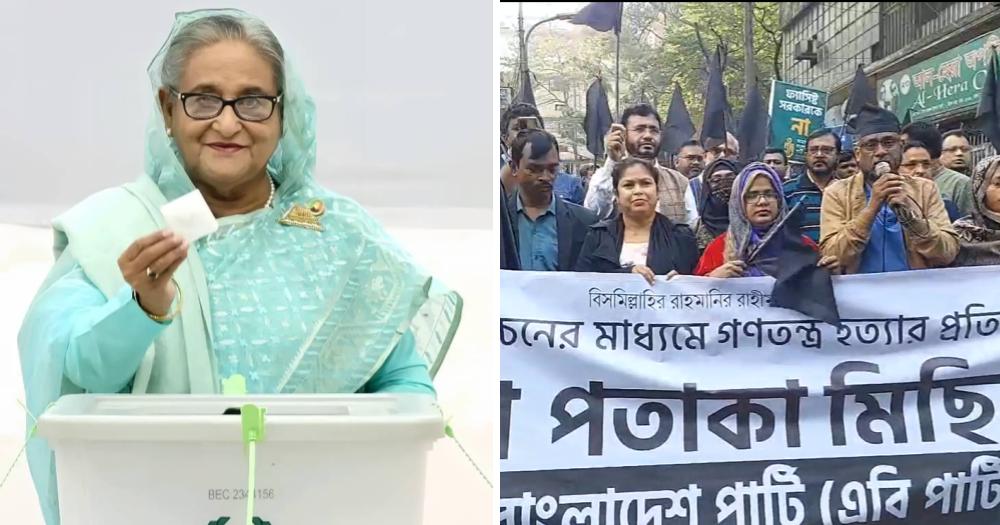Incumbent Bangladeshi Prime Minister Sheikh Hasina, of Bangladesh’s ruling party the Awami League, has won a fifth term as the head of Bangladesh's government, her fourth in succession.
Voter turnout in Bangladesh's Jan. 7 general election was 40 per cent, with many alleging that the official numbers were inflated.
But her victory comes amidst a boycott of the election by main opposition party, the Bangladesh Nationalist Party (BNP), low voter turnout, and the curious expansion in the number of independent members of parliament.
Incumbent victory and economic woes
Since 2009, Sheikh Hasina's Awami League government has presided over a period of significant economic growth and increasing living standards, according to the Lowy Institute’s The Interpreter.
However, these economic headwinds appear to have paused, if not all together stopped.
Bangladesh’s economic troubles predate the recent pandemic, but increasing cost of living due to disruptions in energy and food, have increased worries about inequality and inflation.
The past 18 months have been particularly volatile, with The Interpreter reporting that Bangladesh's central bank has sold more than half of its foreign reserves
Reuters also reports that the International Monetary Fund was in the midst of approving a US$4.7 billion (S$6.3 billion) bailout.
These economic woes are paired with accusations of increased suppression of opposition forces in the country.
Boycott
While The Interpreter reports that concerns about treatment of the opposition have lingered for the better part of a decade, it has come to a head now in part due to what it calls the “flawed elections” of 2014 and 2018.
The BNP previously boycotted Bangladesh’s 2014 elections, but returned in 2018 due to reassurances that the elections would be fair, although BNP supporters say those promises were not kept.
In the run-up to the Jan. 7 elections, BNP supporters have accused the government of arresting thousands of opposition supporters, with 10 reported deaths in recent months, according to the Associated Press.
The BNP called for a return to how elections had been run before 2008, with a neutral government administering during the election period.
But the government rejected those calls, culminating in the BNP calling for Bangladeshi to boycott the Jan. 7 elections, declaring a 48 hour strike, according to Al Jazeera.
There have also been reports of police violence, as well as polling stations being set on fire.
However, the Jan. 7 elections went ahead as planned, but it appears that the call to boycott has been met with a certain measure of success.
Nikkei reports that electoral turnout in 2018 was roughly 80 per cent , but official numbers for 2024 have halved to 40 per cent, with allegations that even that number was inflated.
At 3PM Dhaka Time, it was reported that only 27 per cent of the electorate had voted, but by 5PM that number had jumped to 40 per cent.
This would mean that a quarter of total votes were cast in the final two hours of polling.
Reporting by Al Jazeera cast doubt on this, saying that it had visited 10 polling stations in the capital Dhaka during the final hour of voting, but had seen almost no voters.
Al Jazeera also quoted a former election commissioner accusing the chief election commissioner of, when announcing the official turnout, “uttering 28 per cent first” before saying 40 per cent.
Result
Adding to doubts of the legitimacy of the election have been the result, with Reuters reporting that the governing Awami League won 223 out of 300 seats, unsurprisingly considering their main competition did not participate.
The largest opposition party in parliament, the Jatiya Party, won only 11 seats.
But what is most concerning are the 63 independents who were elected under Bangladesh’s First-past-the-post system.
Reuters reported just before the election of the high number of “independents”.
The BNP accused of being “dummy candidates", allied with the governing Awami League but pretending to be independent to give the election a semblance of competition.
Both the Awami League and some of the Independents interviewed by Reuters have rejected this claim, but a League spokesperson did say that almost 80 per cent of the independents were League members.
Global legitimacy
Bangladesh's government may have trouble gaining political legitimacy internationally after this result.
The United States and the European Union have threatened sanctions, according to Al Jazeera, if fair elections were not held, targeting Bangladesh's vital garment industry.
However, not every global power shed. Such concerns about electoral legitimacy, with the People's Republic of China having already issued it's congratulations to Sheikh Hasina on her electoral victory.
Top Image via Sheikh Hasina/Facebook & Bangladesh Nationalist Party-BNP/Facebook
If you like what you read, follow us on Facebook, Instagram, Twitter and Telegram to get the latest updates.



